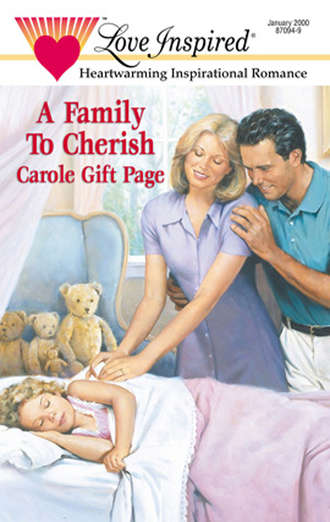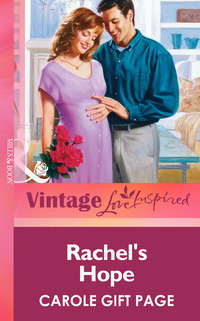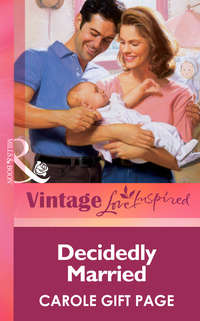
Полная версия
A Family To Cherish
“But someone should be here if she wakes,” said Barbara.
“Leave a number and I’ll call you the moment she stirs.”
Barbara looked at Janee, then nodded. “You’re right. She’s sleeping soundly. We’ll come back later, but please don’t hesitate to call.”
As they headed back down the hall, Doug said, “I’ve got to phone Pam and Benny. They should be here.”
“Then what?”
“I don’t know.” Doug ran his fingers distractedly through his thick, curly hair. “The nurse is right. We need some sleep. Paul and Nancy’s apartment isn’t far from here. Twenty minutes maybe.”
“Then let’s go. We’ll need to contact people and…make arrangements.”
Barbara waited on a sofa in the lobby, while Doug crossed the room to a pay phone and called his older sister Pam in Oregon. Barbara didn’t want to hear him repeat the painful news, didn’t want to imagine Pam and Benny’s shock and grief. She just wanted to be back home again, with everything normal, the way it was yesterday. But then again, what was normal? Barbara’s life hadn’t been normal for years.
Nothing was normal without Caitlin.
“Barb, they’re taking the next plane out of Portland.”
Barbara looked up, startled that Doug had already finished his call. “How did they take the news?”
“The way you’d expect. Shock. Disbelief. Tears.”
Neither Barbara nor Doug said much as they drove the twenty miles to the renovated Victorian house in south San Francisco, where Paul and Nancy had an upstairs apartment.
As Doug unlocked the door, Barbara murmured, “It feels strange coming here like this. Like we’re trespassing.”
“I know, Barb, but it’s got to be done.” Doug opened the door, and they stepped tentatively into Paul and Nancy’s world—a quaint, cluttered apartment that embodied a diversity of styles, from traditional to modern to garage-sale chic. Floral wallpaper, dark mahogany woodwork and intricately carved cornices and moldings were counterbalanced by vinyl beanbag chairs, a leather recliner, a rattan sofa, pine bookcases, and a simulated black marble entertainment unit. Plants abounded—from ceiling to floor, on every table and windowsill: creeping ferns and climbing vines, small pots of violets and hanging baskets of petunias, and plant stands with large, leafy philodendron, all badly in need of watering.
“Your sister made an art of clutter,” said Barbara, noting the books, magazines, canvases and sheet music strewn around the room. A guitar was propped in one corner, an easel in another. “I’d forgotten what a creative person she is.”
“When I was growing up, she was always dabbling in something,” said Doug wistfully, picking up an unfinished still-life. “Always writing a poem, painting a picture, picking out a tune on her guitar.”
“And what were you doing?” asked Barbara softly as she examined a charcoal rendering of Janee.
Doug chuckled ruefully. “I was putting splints and bandages on my sisters’ dolls. I even tried operating on Pam’s favorite Raggedy Ann. Cut the thing nearly in two. Stuffing everywhere. Told her I was doing a heart transplant. She wasn’t amused.”
Barbara gave him a gentle smile. “Even then you were preparing to be a great surgeon.”
Doug grimaced. “And where’d it get me?”
“You’re still a great surgeon. You just refuse to see it.”
Doug let the unfinished canvas clatter on the coffee table, and countered, “How did this get to be about me?”
Barbara looked away. She couldn’t handle this rift today. Some other time. “We’re both exhausted, Doug. Let’s get some sleep and talk later.”
“Okay by me. I’ll grab a glass of water first.” He headed for the kitchen, and she followed. It was a clean, compact kitchen with more plants in the garden window and lots of curios and handmade knickknacks on the counters. Janee’s colorful drawings covered the refrigerator door.
“Looks like Janee has some of her mother’s talent,” he said with a catch in his voice. He turned on the spigot and ran the water until it was cold.
Barbara got two glasses from the cupboard and handed them to him. “Do you want me to fix us something to eat? I’m sure there’s something I could whip up.”
He filled her glass and gave it to her. “No, I couldn’t eat. You go ahead.”
“Maybe later.” They went down the hall to Paul and Nancy’s room and hesitated for a few minutes before lying down on the neatly made queen-size bed. “It feels strange being here like this,” said Barbara, easing herself down so she wouldn’t muss the chenille spread. “I’m too tense to relax. Maybe we should have stayed at the hospital.”
Doug rolled onto his side and ran his hand soothingly over her arm. “Try to sleep, Barbie. We need our rest. We’ve got a long, hard road ahead of us, and we’ve got to be strong.”
Stronger than we were when Caitlin died? she wondered silently. How can we be strong now when we still haven’t got past that loss?
Barbara fell into a fitful sleep punctuated by vivid, exhausting dreams. She and Doug were climbing a mountain, trying to reach Caitlin, who stood perched on a precipice, crying for help. No matter how high they climbed, there was always more rugged terrain waiting to be scaled. When they finally reached the spot where Caitlin had stood, she was gone, and they were alone on the mountain, just the two of them, buffeted by dark winds, with the precipice yawning like a black hole below them. “We’ll fall unless we hang on to each other,” she told Doug, but when they tried to embrace, the winds and the darkness drove them apart.
Barbara woke suddenly, her heart pounding, her face wet with perspiration. Doug was no longer in the bed beside her. An irrational fear seized her, coupled with the lingering memory of the black chasm. She bounded off the bed and rushed into the living room, her breathing ragged.
Doug sat on the rattan sofa, talking on his cell phone. “Thanks, Jim, I’d appreciate anything you could do.” He hung up and looked at Barbara, his eyes shadowed with weariness. “I asked some of my old colleagues who are practicing in San Francisco to take a look at Nancy. See if they can help.”
“Do you think they can?”
“They’re going to talk with her physicians.”
Barbara sat down beside her husband. “Did you get any sleep?”
“Enough. How about you?”
“I dreamed mostly. More like nightmares. I feel as if I don’t want to close my eyes again.”
Doug took her hand and caressed it gently. “I’m going back to the hospital, Barb. Why don’t you stay here and try to rest.”
“No, Doug. I want to go with you.”
He squeezed her hand and smiled faintly. “Okay. Let’s freshen up and head back.”
They arrived back at the hospital just as the sun was lowering, a pale orange ball on a hazy, salmon-pink horizon. In the ICU waiting room they found Doug’s sister Pam and her husband, Benny Cotter, talking with a physician.
“It’s Dr. Glazier,” said Doug. “He must have news.”
With hushed, solemn words Barbara and Doug greeted Pam and Benny. Pam was an attractive, sophisticated brunette in her mid-thirties, and Benny, a balding, impeccably dressed man with a ski nose and a booming baritone voice. They owned a used car dealership outside Portland. Benny sold cars; Pam worked for an accountant and helped keep the books for Benny in her spare time. Doug always said they were an unbeatable team; they knew how to make money and how to keep it.
The two couples embraced briefly, then turned back to the doctor. “How is my sister?” asked Doug.
Dr. Glazier was stony-faced as he said, “Dr. and Mrs. Logan, I was just telling Mr. and Mrs. Cotter that your sister has slipped into a coma. I’m sorry. It doesn’t look good.”
They talked with the physician at length, Doug doing most of the talking, using medical terms Barbara couldn’t follow. When there seemed to be nothing more to say, the two couples took turns checking on Nancy, who looked as if she were peacefully asleep. Then they visited Janee’s room. She, too, was slumbering serenely and her coloring was better; the nurse assured them she would likely be awake and alert in the morning.
It was after nine when they went to the hospital cafeteria for coffee and a bite to eat. As she ate, Barbara’s weariness deepened. Conversation around the table was sparse, forced, hollow. The four of them had never been close, held little in common in attitudes, beliefs or interests, and now it seemed even harder to find common ground, aside from this sudden tragedy they shared.
The truth was, Barbara had always considered Benny an insufferable boor and Pam a brittle, self-serving woman who could be catty and mean-spirited one moment and nauseatingly saccharine-sweet the next. Barbara always had the feeling she should be on guard around Pam, as if Pam were secretly comparing herself with others and looking for ways to undermine the competition. Such negative feelings made Barbara feel guilty and uneasy. Maybe she herself was the one making such comparisons and looking for ways to diminish Pam and Benny. Maybe they had no idea how they came across to others. Maybe this whole undercurrent of dissension lay solely in Barbara’s own mind.
That was what Doug said whenever Barbara had questioned Pam and Benny’s actions or motives over the years. “What is there about Pam that makes you feel so inadequate, Barbie?” Doug had asked her after one of their rare visits. “Do you resent them for choosing not to have children because it would interfere with their freewheeling life-style? Do you dislike Pam because she’s not the maternal, nurturing type? She’s not you, Barbie. Why don’t you just try to be friends with my sister instead of second-guessing her?”
Barbara had no answer. Maybe Doug was right. Maybe the problem was her own. And yet now, sitting across from Pam and Benny as the four of them commiserated, dawdling over lukewarm coffee and cold soup, Barbara knew her instincts were correct. She would never trust Pam and Benny with anything precious to her.
“I still can’t believe this is happening,” Pam was saying as she stirred cream into her third cup of coffee. “I’m not good with things like this. I just fall to pieces inside. I’m a bundle of nerves.” She held her hand up, her red acrylic nails catching the light. “Look at me. I’m shaking.”
“We’re all feeling that way, Pam,” said Doug, sipping his coffee.
Pam’s voice grew shrill. “Nancy’s not going to make it, is she, Doug? You’re a doctor. You know these things.”
“I’m not giving up on her, Pam, and neither should you.”
“And poor Paul,” Pam went on miserably. “Now we have a funeral to plan. I can’t do it. I wouldn’t know the first thing. I hate funerals. I never go, do I, Benny?”
He nodded. “This lady will skip her own funeral—I’m not kidding.”
“You don’t have to plan the funeral, Pam,” said Doug. “Just be available. Barbara and I can make the arrangements, can’t we, Barb?”
Barbara stared into her coffee cup, biting her lip to keep from saying what she really felt.
“Would you, Doug? I think that would be best,” said Pam. “After all, you and Barb have, uh, well, you know…had the experience already. You know what to do.”
Barbara’s stomach knotted and a sour taste rose in her throat. Yes, she and Doug knew all about funerals. Four years ago Pam and Benny were out of the country on vacation and missed Caitlin’s funeral. They sent an enormous bouquet of pink roses, but never again mentioned Caitlin’s name, never even acknowledged in their conversations that she had ever existed. For Barbara, that was the worst sort of betrayal.
But then, she and Doug never talked about Caitlin either.
“We can’t stay in town more than a couple of days,” said Benny. “You know how it is, Doug. When you’re in business for yourself, you gotta stay at the helm or the ship sinks.”
“Will you be leaving, too, Pam?” asked Barbara.
“It depends on how Nancy does. But Benny’s right. When he’s away from the dealership more than a day or so, everything falls apart.”
Barbara dabbed at a water ring on the table. “The doctor says Janee will be released from the hospital in a few days. She’ll need care until Nancy recovers.”
Pam stared openmouthed at Barbara, then flashed a quizzical glance at Doug and Benny. “My goodness, I just supposed…”
“What?” challenged Barbara. “That we’d take Janee?”
“Well, yes,” said Pam, her voice rising with a slight falsetto tone. “You’d know what to do. After all, you’ve had experience—”
“You can say it, Pam,” said Barbara ruefully. “We’ve had experience raising a child.”
“Yes, exactly. That’s what I meant. And if you had to, um, keep Janee, well, you’d have a child again. You’d like that, wouldn’t you?”
“Are you saying I’d have a replacement for Caitlin?” said Barbara thickly.
“Come off it, Pam. You can’t replace a child,” said Doug through clenched teeth.
Pam raised her chin defensively. “I know that, Doug. That’s not what I meant. It’s just that you and Barbara are both so fond of children, I thought you might enjoy having a child in your home again.”
Not on your life! Barbara wanted to shout, but she resisted the urge. “Are you telling us you don’t want to take Janee?” she asked instead.
“You know us,” said Benny. “Pam and I decided right up front, no kids, ever. With both of us working twelve-hour days, what could we give a kid?”
Love, for a start, thought Barbara. But a dark reality struck home. That was something she herself wasn’t ready to give. She had loved one child once. She couldn’t imagine ever loving another.
“Besides, you work at home, Barb,” said Pam. “A child wouldn’t upset your routine. You could still give your piano lessons.”
“Listen, this is a moot issue,” said Benny, raising his large, square hands like a referee. “I believe Nancy is going to get well, so taking care of the kid will be a temporary arrangement. You can handle that, right, Barbara?”
Barbara pretended not to hear the question. At the moment, with Nancy’s life hanging in the balance, Barbara had all she could handle just sitting at this table carrying on a simple conversation and trying to keep her sanity.
Doug reached across the table and cupped his hand over hers. “No one’s making any decisions about Janee tonight,” he said firmly. “Let’s all try to get a good night’s sleep—and see what tomorrow brings.”
Chapter Four
At dawn Barbara was awakened out of a deep, dream-filled sleep by the phone’s shrill ring. She raised up groggily on one elbow, trying to comprehend where she was. This wasn’t her room or her bed. Nothing was familiar. Then, as Doug grabbed the phone and sleepily barked hello, Barbara remembered with a spine-chilling shudder. Reality was worse than her troubled dreams.
She mouthed the words Who is it? But Doug waved her off, his expression grim. “Yes, I understand, Doctor,” he said solemnly. “I know you did all you could. Thank you.”
He hung up the receiver and turned to Barbara, his features stoic. But as she stared at him, his stony face crumbled and he began to weep. “She’s gone, Barbie,” he whispered.
She moved quickly over to his side of the bed and enveloped him in her arms. His chest was bare and his skin cold to her touch. She wanted to say, It’ll be okay; Nancy just slipped away with the angels in her sleep. We’ll see her again someday. But she knew Doug didn’t want to hear such platitudes now, any more than she had wanted to hear them when Caitlin died, even though they were true. She and Doug clung to each other, rocking together with a slow, agonized rhythm. The sobs rose in his chest, and she could feel them in her own breast.
They had wept like this four years ago, but then somehow they had broken apart and gone their separate ways, burying their grief where the other couldn’t find it. Why had it happened that way? Why had they bottled up their tears and retreated behind separate barricades as if they considered one another, rather than death, the enemy.
“At least she went peacefully in her sleep,” said Doug in little more than a whisper. “There was no one like her, Barb. She was so full of life.”
“And she never wasted a moment of it, darling.”
Doug nodded. “If only we could all be like her.”
“Maybe that’s her legacy. We can try to be.”
Doug released Barbara, got up and put on a shirt, his fingers working the buttons as he said, “I’d better start making some phone calls. We’ve got a lot of arrangements to make.”
“First you’d better call Pam and Benny at the hotel.”
“I will. Put on the coffee, okay, Barb?”
“You need more than coffee, Doug. I’ll fix something. Eggs. Cereal.”
“Anything. I’m not hungry.”
She drifted through the living room to the kitchen, her eyes moving over Nancy’s things—her paintings, her belongings, all the ordinary odds and ends that defined her life. I don’t belong here, Barbara thought. I shouldn’t be intruding. Surely Nancy will walk in at any moment and say, “Don’t disturb my things. Don’t dismantle my life. I’m not really gone.”
A ridiculous notion, Barbara realized as she put on the coffeepot and browsed through the refrigerator. But then, wasn’t that exactly the attitude Barbara had maintained for four years—never allowing anything or anyone to disturb Caitlin’s room, as if she might come back at any moment and reclaim her things?
A wave of emotion rocked through Barbara like a tidal wave. She stumbled over to the small oak table and sat down, putting her head in her hands, allowing the sobs to wash over her. It struck her that she wasn’t just weeping for Nancy and Paul; she was crying again for her own daughter. Why was it that every heartache and grief always brought her back to this one, leaving her mourning again for Caitlin as if it were the very first time?
The next three days were among the busiest, the most hectic and exhausting Barbara had ever experienced. Together with Pam and Benny, she and Doug packed up Paul and Nancy’s belongings, carted crates to Goodwill and put the furniture in storage. Doug and Benny notified people, handled the business matters, and made funeral arrangements, while Barbara and Pam spent time at the hospital with Janee, assuring her she would be fine and they would take good care of her.
On the third day they attended the double funeral in the morning, followed by a brief grave-side service at the nearby cemetery. They received condolences from Paul’s and Nancy’s many friends at a luncheon reception put on by their church; then they met with the probate attorney late that afternoon.
Jonathan Wallace, a distinguished, gray-haired gentleman with a small goatee, had been Paul and Nancy’s attorney since their first year of marriage. After offering his sympathies and inviting the two couples to sit down across from his huge mahogany desk, he got right down to business. “Your sister and her husband had a living trust,” he said, opening a maroon portfolio and extracting several official-looking documents. “I won’t bore you with reams of details. You can read the papers at your convenience. Essentially, Paul and Nancy left a modest estate. However, they had a sizable life insurance policy which will provide a generous trust fund for their daughter, Janee. They specified that in the event of their death, Janee be placed with you, Dr. and Mrs. Logan. If for some reason you are not able to become Janee’s legal guardians, they wish her to be placed with the two of you, Mr. and Mrs. Cotter.”
Pam spoke up. “Mr. Wallace, we’ve already talked about it and agreed that Barbara and Doug should take the child. I work full-time for an accounting firm and part-time for my husband, so I’m hardly ever home. But fortunately Barbara works at home giving piano lessons, so she’ll be available to care for Janee.”
A tremor of alarm spiraled through Barbara’s stomach. “Wait a minute. We may have talked about this, but nothing was decided.”
Doug reached over and seized Barbara’s hand. “What are you saying, Barb? You know Nancy wanted us to have Janee. We gave her our promise.”
Barbara’s alarm turned to frantic butterflies, their fluttering wings doing a number on her digestive system. If they didn’t let up, she was going to be ill. “I can’t,” she said shakily. “I just can’t do it.”
“Barbara, are you saying you won’t take Janee?” challenged Pam, her voice shrill. “Are you forcing her on us? You know we never wanted kids. Not our own or anyone else’s. We’ve made no bones about it.”
“I—I’m just saying—”
“I would think you’d be glad to have another little girl in your home,” said Benny in his booming baritone. “Man alive, Barbara, she’s the same age your girl was. What more could you ask for? I mean, is this a coincidence or what?”
Tears stung Barbara’s eyes. “My heart aches for Janee, but it’s not the same, and you know it.”
“Of course it’s not the same,” said Doug, squeezing Barbara’s hand. “But Janee’s all alone now. Someone’s got to take care of her. It might as well be us.”
Barbara searched his eyes. “Do you really think we can do it?”
“I don’t see where we have any other choice, Barb. We’ll make it work. We promised Nancy.”
“You were a terrific mother, Barb,” said Pam, her tone now sweet and cloying as honey. “And you’ll be a great mother again. Just give it a chance. You’ll see.”
Barbara had great misgivings as she and Doug drove to the hospital the next morning to pick up Janee. How do I do this? she wondered as they walked down the corridor to Janee’s room. How do I play Mommy to a child too young to understand what has happened, a child who wants only her own mother and father, the two people she can never have?
“It’ll be okay,” said Doug, slipping his arm around Barbara’s waist as they walked. “You know the old saying—All things work together for good.”
“That’s not just a saying. It’s from the Bible,” she said, thinking how long it had been since they had studied the Bible together.
“I know that,” said Doug. “I once knew the verse by heart.”
She looked up at him. “I’m scared, Doug. What if she doesn’t want to go with us? What if we’re all miserable together?”
“Don’t borrow trouble, Barbie. It’ll work out. Remember what you used to say—trust the Lord.”
“I did trust Him,” she murmured, “and look where it got us.”
He stopped and stared at her. “What’s gotten into you, Barb? You never used to talk like this.”
“You know the answer to that as well as I do.”
“It’s my fault,” he muttered. “Isn’t that what you’re really saying?”
“Of course not.” She turned her gaze away, not wanting him to see her pain. “It’s not you, Doug. It’s everything.”
“It’s Caitlin. Always Caitlin.”
“All right, yes. You’re right as always. I keep asking the same questions and there’s never an answer. Why would God take away the daughter we loved and give us a child we hardly know? Is He punishing us? Laughing at us? It’s such a terrible irony.”
“Maybe good will come of having Janee in our home, Barb. We have to give it a chance.”
“That’s easy for you to say. You’re gone all the time. I’ll be the one at home every day with Janee.”
“I’ll make time for her. For you. I promise.”
They had reached Janee’s room now. Barbara paused in the doorway and looked up at her husband, hoping his strength would sustain her, as well. They exchanged brief smiles and went inside.
Janee was sitting up in bed, cross-legged. A young nurse with rosy cheeks and French braids was helping her dress, pulling an undershirt over her head. “There you are, sweet pea. Now we have a pretty little dress for you to wear. Isn’t that the cutest thing? You’re going to look so pretty when you go home.”
Barbara crossed the room and stood at the foot of the bed. “Well, look at you, Janee,” she said in her most animated voice. She felt as if she were performing, or worse, auditioning, with her very life at stake. “Sweetheart, you look like Cinderella going to the ball.”
The child looked up guardedly, her face framed with silky flaxen curls, her large cerulean eyes filled with doubt. “I’m not Cinderella. I’m Janee. I’m going home.”







